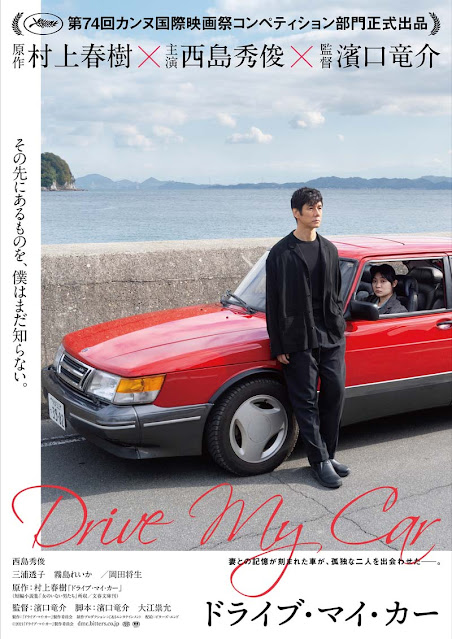From the director of Asako I & II (寝ても覚めても) comes Drive My Car (ドライブ・マイ・カー). This Japanese drama-road film directed by Ryūsuke Hamaguchi, adapted by Hamaguchi and
Takamasa Oe and primarily based on Haruki Murakami's short story of the same name. An aging, widowed actor seeks a chauffeur. The actor turns to his go-to mechanic, who ends up recommending a twenty-year-old girl. Despite their initial misgivings, a very special relationship develops between the two.
Perfectly calibrated as a piece dependent on nuanced performances and an exacting tone, the film rewards those willing to invest and engage in all that Lee refuses to spell-out or show to his audience. It's the script that shines: layered with hefty metaphors and symbolism, yet the film is surprisingly subtle. It unfolds like a poem in its esotericism, wearing the ambiguity on its sleeves that make for something almost entirely transfixing. Whether deliberate or tedious, meditative or dull, depends on the eye of the beholder, and as thrilling and fantastic as certain elements are, other tested the bounds of patience. As often happens in the films of Hamaguchi, there comes a mysterious moment when the scattered threads of the plot begin to tie together, and the film suddenly moves up to a higher level of intensity. Despite the uneven narrative, the film is a visually striking slow-burner of a mystery with three intriguing performances. The film is patient with the story. He illustrates the rather grim reality of how circumstance and people can define you and shape your perception of the world for better or worse. For Murakami's regular readers, the film will be a stimulating revelation; for movie lovers, an invitation to venture into the complex intellectual orbit of this great Japanese storyteller.
Takamasa Oe and primarily based on Haruki Murakami's short story of the same name. An aging, widowed actor seeks a chauffeur. The actor turns to his go-to mechanic, who ends up recommending a twenty-year-old girl. Despite their initial misgivings, a very special relationship develops between the two.
Though the film is primarily based on Murakami's short story of the same name from his 2014 short story collection, Men Without Women, the script also features elements from Murakami's stories Scheherazade and Kino (both also part of Men Without Women). Hamaguchi chose adapting Murakami's text for two reasons: because the characters were in a car, and also because of the questions of acting that the story explored. The film was originally set in Busan, South Korea, but was changed to Hiroshima due to the COVID-19 pandemic. Hamaguchi wished to incorporate the Beatles' song Drive My Car, which the film and story are named after, however it was too difficult to get permission for its usage. He instead included a string quartet piece by Beethoven, which is directly referenced in Murakami's original story. The original story features a yellow Saab 900 convertible, but it was changed in the film to a red Saab 900 Turbo to visually complement the Hiroshima landscape.
The film stars Hidetoshi Nishijima, Tōko Miura, Masaki Okada and Reika Kirishima. Thanks to the terrific performances from the cast, the characters and viewers are taken on a journey that both fascinates and unsettles.

.png)
No comments:
Post a Comment